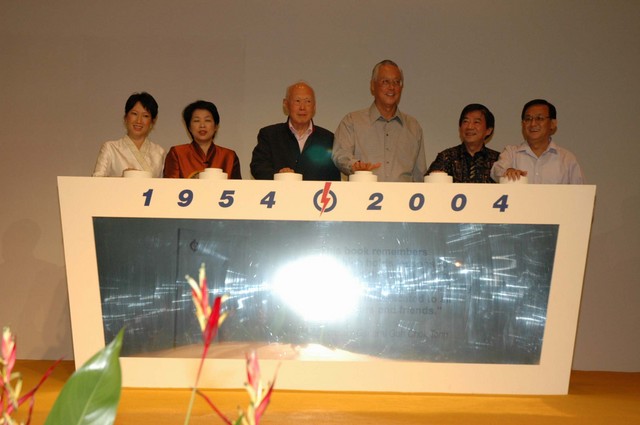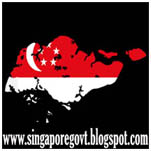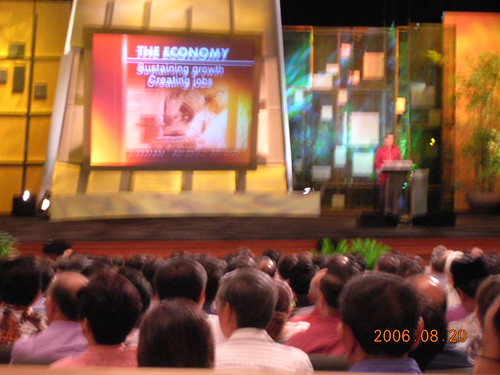 Upon an anonymous suggestion, I’ve decided to write something and some thoughts on the National Day Rally (NDR). Since many of us are sick of the “aerial” and “ground bombardment” of post-NDRs, I should write something different about this year’s NDR. Perhaps before starting on any thoughts it might be interesting (things that I’ve found boring was interesting to the readers and vice versa, so when I say its interesting, it might be boring! Readers beware!) to have some fun facts on the NDR.
Upon an anonymous suggestion, I’ve decided to write something and some thoughts on the National Day Rally (NDR). Since many of us are sick of the “aerial” and “ground bombardment” of post-NDRs, I should write something different about this year’s NDR. Perhaps before starting on any thoughts it might be interesting (things that I’ve found boring was interesting to the readers and vice versa, so when I say its interesting, it might be boring! Readers beware!) to have some fun facts on the NDR.Things you didn’t get to see on national TV
1) Who was the last MP to arrive at the National Day Rally?
Mr Ong Chit Chung. The MP from Jurong GRC, Bukit Batok Division, came in the hall a whooping 5 minutes late and after PM Lee had already started his speech. It didn’t help much to be stealth when he wore a red shirt brighter than the PM’s. It was a close fight between him and the former MP, Wong Kai Yuen who came in slightly later than Ong Chit Chung. But Wong Kai Yuen lost out on this one, as he is no longer a MP. Unanimously, the award had to go to Ong Chit Chung.
2) Who was the last Minister (aside from MM Lee and PM Lee) to be seated?
Tharman Shanmugaratnam. The Minister for Education and MP from Jurong GRC (there must be something with MPs from Jurong) took his seat just before the tradition last arrival of MM Lee. However, he was one of the earliest Ministers to arrive to the University Cultural Centre and mingled with the audience during the reception before the Rally. Other early comers included Foreign Minister George Yeo and Minister Lim Swee Say. Strangely, Tharman was the last to take his seat. Perhaps he might have remembered the perpetually endless toilet queues during the “half-time” break of NDR at last year’s NDR.
3) What was most peculiar and different about this year’s Rally that no one noticed?
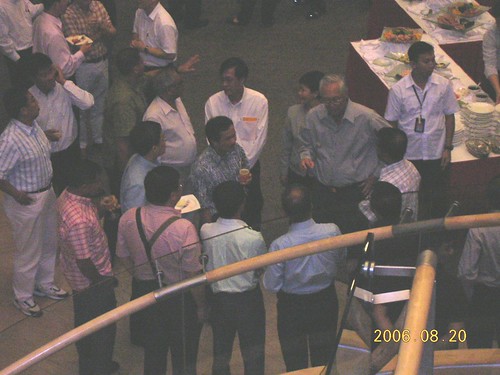 This one is really curved-ball and has to do with SM Goh. Traditionally, just before the start of every rally, all will be seated before MM Lee Kuan Yew enter the hall to a rousing applause by all. The past two NDRs, SM Goh entered just before MM Lee and was received by applauses from the audiences. This year’s National Day Rally, GCT entered the hall with no one applauding him despite him turning around to face the audiences, expecting an applause. He intended to wave at the audience, but given the zero response, he turned back, sat down and didn’t move until to the Rally ended. Maybe he met with tough audiences or was just a victim falling from grace. But you could sense and see his disappointment. After the Rally, GCT was with Mah Bow Tan chatting about their perception on the youth near the buffet table. From my “eavesdropping”, I believed they weren’t talking about his non-applause. ;)
This one is really curved-ball and has to do with SM Goh. Traditionally, just before the start of every rally, all will be seated before MM Lee Kuan Yew enter the hall to a rousing applause by all. The past two NDRs, SM Goh entered just before MM Lee and was received by applauses from the audiences. This year’s National Day Rally, GCT entered the hall with no one applauding him despite him turning around to face the audiences, expecting an applause. He intended to wave at the audience, but given the zero response, he turned back, sat down and didn’t move until to the Rally ended. Maybe he met with tough audiences or was just a victim falling from grace. But you could sense and see his disappointment. After the Rally, GCT was with Mah Bow Tan chatting about their perception on the youth near the buffet table. From my “eavesdropping”, I believed they weren’t talking about his non-applause. ;)4) Did former Ministers get any stick from their ex-colleagues?
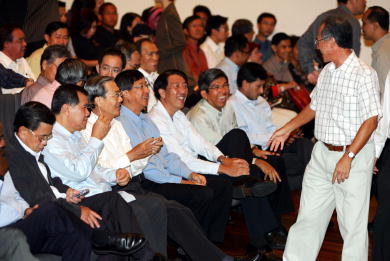 Unlike last year, when David Lim (former Acting Minister for MICA) walked across the whole front row Cabinet Ministers without any eye contact and smile from both parties, this year’s former Ministers faired better. Former DPM Dr Tony Tan had a lengthy conversation with now DPM Wong Kan Seng just before the Rally started and was well-received by all Ministers and MP. Former Transport Minister Yeo Cheow Tong had some mixed reactions. He was largely ignored by some Ministers (DPM Wong Kan Seng rather focus on his mobile phone than to look at his ex-colleague) but was greeted with smiles by some others like the ever-friendly Lim Swee Say, Lee Boon Yang and Teo Chee Hean. Only Dr Balaji Sadasivan, literately and physically, bent backwards to shake Yeo Cheow Tong’s hand.
Unlike last year, when David Lim (former Acting Minister for MICA) walked across the whole front row Cabinet Ministers without any eye contact and smile from both parties, this year’s former Ministers faired better. Former DPM Dr Tony Tan had a lengthy conversation with now DPM Wong Kan Seng just before the Rally started and was well-received by all Ministers and MP. Former Transport Minister Yeo Cheow Tong had some mixed reactions. He was largely ignored by some Ministers (DPM Wong Kan Seng rather focus on his mobile phone than to look at his ex-colleague) but was greeted with smiles by some others like the ever-friendly Lim Swee Say, Lee Boon Yang and Teo Chee Hean. Only Dr Balaji Sadasivan, literately and physically, bent backwards to shake Yeo Cheow Tong’s hand.5) Who was notably absented from this year’s NDR?
MM Lee’s wife. This is probably the first National Day Rally that she didn’t attend, or maybe I just didn’t see her there. I don’t think anyone did. Usually, she will be seated on the right side centre stand of the auditorium, with her daughter, Lee Wei Ling. But no conspiracy or wild guess, please! I do have vested interest in the stock market!
6) What usually happen after National Day Rallies?
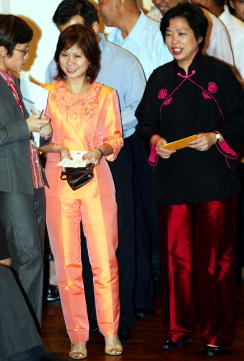 This is something good-to-know if you ever get invited to National Day Rally. Traditionally, there will be receptions (of course with food) before and after the Rally where the Ministers and MP mingled with the attendees. But there is an implicit observation that many don’t see. Grassroots and Party (PAP of course) cadres are usually invited to the rallies. And Ministers and MPs will also gather with their constituency members for discussions and chitchats. Occasionally, the Ministers will be talking among each other on work related issues or with prominent businessmen. But most of the time, they will be with their own grassroots. Before going to that, just some quick observations. Dr Vivian was seen with DPM Jayakumar, Mah Bow Tan with SM Goh and Lim Hng Kiang was with Kwek Leng Joo, the Managing Director of City Development Limited (CDL) – formerly in the running for the Marina IR with Las Vegas Sands. Now for the main course: what is the implicit message?
This is something good-to-know if you ever get invited to National Day Rally. Traditionally, there will be receptions (of course with food) before and after the Rally where the Ministers and MP mingled with the attendees. But there is an implicit observation that many don’t see. Grassroots and Party (PAP of course) cadres are usually invited to the rallies. And Ministers and MPs will also gather with their constituency members for discussions and chitchats. Occasionally, the Ministers will be talking among each other on work related issues or with prominent businessmen. But most of the time, they will be with their own grassroots. Before going to that, just some quick observations. Dr Vivian was seen with DPM Jayakumar, Mah Bow Tan with SM Goh and Lim Hng Kiang was with Kwek Leng Joo, the Managing Director of City Development Limited (CDL) – formerly in the running for the Marina IR with Las Vegas Sands. Now for the main course: what is the implicit message?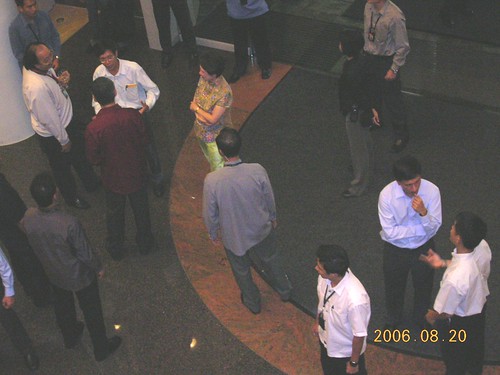 PM and the rest of the senior leaders will also be at the reception to mingle with the crowd. But sometimes, what is evident is that this is one of the occasions to assess how well supported are the Ministers and MPs by their grassroots. Every NDR, there are two areas for reception, the second floor and the first floor. For the MPs and Ministers to get maximum exposure, they will usually be at the floor where the PM is. Second floor is a lot quieter. But those Ministers and MPs who are not too concern over this will visit the second floor to mingle. Some spotted at the second floor includes, Foreign Minister George Yeo, Senior Minister of State Dr Balaji Sadasivan and MP Wee Siew Kim. {See Photo: PM Lee is in red shirt with back facing the camera. Can you spot the other Minister "near" him?}
PM and the rest of the senior leaders will also be at the reception to mingle with the crowd. But sometimes, what is evident is that this is one of the occasions to assess how well supported are the Ministers and MPs by their grassroots. Every NDR, there are two areas for reception, the second floor and the first floor. For the MPs and Ministers to get maximum exposure, they will usually be at the floor where the PM is. Second floor is a lot quieter. But those Ministers and MPs who are not too concern over this will visit the second floor to mingle. Some spotted at the second floor includes, Foreign Minister George Yeo, Senior Minister of State Dr Balaji Sadasivan and MP Wee Siew Kim. {See Photo: PM Lee is in red shirt with back facing the camera. Can you spot the other Minister "near" him?}The support from the grassroots can be quite an important assessment guide of the MPs, by the PM. If a MP doesn’t seem to have grassroots support for the major events, how well can he/she even connect with the rest of the constituency and the voters? Don’t need to believe my words, by if you have a chance, observe it for yourself and make the conclusion.
7) Was Thrasymachus at the National Day Rally?
If he wasn’t there, how could he write the above observations (not conclusions)? ;)
Thrasymachus’s Thoughts on the National Day Rally
This section could be potentially so boring that it could tranquilize an elephant that can read. So please beware! Lame jokes aside, I’ll not be mentioning the stuff and so-called “analysis” on the papers but just some implicit notes and punts (not the “mee siam mai harm” kind) used by the PM.
Contrary to popular belief that only the PM drafts the NDR speech, it is not the case. The whole Cabinet is involved in the process of tailoring the speech. Thus, long before the day itself, all Ministers would have already known the content but not the delivery. This year’s NDR, he highlighted several key areas to focus on, namely, population, digital age and Singapore Heartware. Through his speech, you can also see which Ministers he has more interaction with and which Ministers are not. Many people also underestimated the NDR as a platform and channel to communicate implicit messages to the people. Like in 2003, then-PM Goh Chok Tong mentioned several key Ministers that LHL should retain when he steps down. NDR remains as an important platform for the PM.
Rising Stars and Setting Sun
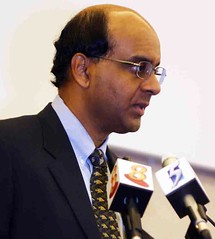 In the past three National Day Rally by LHL, only one Minister was mentioned in every of his speech: Education Minister Tharman Shanmugaratnam. Each time, the comment regarding Tharman was directed on their seemingly casual conversations. Perhaps he was consulted often by the PM and might be groomed for greatness. Aside from the commonly mentioned Ministers, there are also the “punts intended”. In this year’s NDR translation from his Chinese speech, he mentioned this, “Two years ago, we introduced major policy changes to encourage couples to have more babies. So far the results have been very modest.” Two years ago, Lim Hng Kiang was the Minister-in-Charge of the birth rates policies. Punts intended? Maybe. Given the amount of budget spent on improving the birth rates, he has done quite an abysmal job. But in the first place, this task was not something that one could easily manage and be done within two years. In other words, this is quite a suicidal task.
In the past three National Day Rally by LHL, only one Minister was mentioned in every of his speech: Education Minister Tharman Shanmugaratnam. Each time, the comment regarding Tharman was directed on their seemingly casual conversations. Perhaps he was consulted often by the PM and might be groomed for greatness. Aside from the commonly mentioned Ministers, there are also the “punts intended”. In this year’s NDR translation from his Chinese speech, he mentioned this, “Two years ago, we introduced major policy changes to encourage couples to have more babies. So far the results have been very modest.” Two years ago, Lim Hng Kiang was the Minister-in-Charge of the birth rates policies. Punts intended? Maybe. Given the amount of budget spent on improving the birth rates, he has done quite an abysmal job. But in the first place, this task was not something that one could easily manage and be done within two years. In other words, this is quite a suicidal task.To Make or Import?
Since Goh Chok Tong’s time as PM until LHL, birth rate policies and incentives have always been a permanent fixture in NDRs and Budget speeches. But for the PM to highlight this issue but totally not speak about birth rates policies or incentives is quite a significant deviation from the norm. First, this might signal that they have given up their continual monetary incentive efforts of improving birth rates. Second, they would rather opt for a short-term fix in getting foreign talents than to pursue a seemingly lost cause. Lastly, if both are true, then they have to resolve the tension between the foreigners and locals. The foreign talents policy has been around for sometime, but seldom mentioned in NDRs as it is potentially touchy. Phrasing in the wrong manner, may have significant consequences. But I think the PM carried it well.
The Policy “Face”
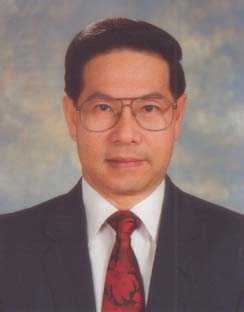 Political science lesson 201: Every policy needs a “face”. This means that for every policy, some ministers must take responsibility or take the face of it. Name any policy, and you should or must be able to find a face to it. Like Goh Chok Tong’s initiative of the CPF cuts during the economic downturn, George Yeo to FTAs, or the building of MRT to Ong Teng Cheong’s credit, are the faces of the policies. So far, Lee Hsien Loong has been elusive in doing that, rightly so. Since taking on the post of Prime Minister, he has been careful in avoiding putting his face on any policies, except the IR. I don’t think that he is trying to sidestep any responsibility or controversy but is a deliberate strategy to strengthen his hold on his leadership.
Political science lesson 201: Every policy needs a “face”. This means that for every policy, some ministers must take responsibility or take the face of it. Name any policy, and you should or must be able to find a face to it. Like Goh Chok Tong’s initiative of the CPF cuts during the economic downturn, George Yeo to FTAs, or the building of MRT to Ong Teng Cheong’s credit, are the faces of the policies. So far, Lee Hsien Loong has been elusive in doing that, rightly so. Since taking on the post of Prime Minister, he has been careful in avoiding putting his face on any policies, except the IR. I don’t think that he is trying to sidestep any responsibility or controversy but is a deliberate strategy to strengthen his hold on his leadership.Every Prime Minister needs to step out of the shadow of his predecessor, just like GCT differentiating himself from LKY, Abdullah Badawi from Mahathir. This is no easy task. But LHL is a quick learner in this field. What some new leaders did wrong was taking an issue or policy to benchmark as “success” over the transition. When Badawi took over from Mahathir, he took himself to task of eliminating corruption in the government as his report card. And he announced this even before he has grip and control over the government. Without the good ground support, he was doomed to fail from the start and is now attacked because that was his benchmarking policy and he is the face to it. LHL has smartened from this. Instead of putting his face to the policies, he delegates the policy implementation to other Ministers once he has initiates it. An example would be the population control responsibility being with Wong Kan Seng after the NDR.
Political leaders can only be criticized or attacked in two areas, leadership and policy. Leadership can be hidden as long as your team publicly voice support for you. Policies are in the public eye and success depends also on the public eye. This, of course, is more difficult to predict or manage. Thus, unless LHL is confident that he has control over the government, with his people in place, he will be and should be “elusive” in the policy limelight. And NDR is the stage where he has to be in the policy limelight. Hence, this NDR was purposely focused on broad issues, no specific policies, general and directional at best.
The Brown Man Causing Black Faces?
Yes, the latest Mr Brown’s “mai hum feat. PM Lee” got me tickling. Maybe this is already stale news to many but maybe I could just give a little heads up on what happened behind the Brown saga from MICA’s point of view.
We all reacted strongly in the way the MICA’s Press Secretary K Bavani responded to the article. But maybe you didn’t know this but several Ministers were very upset with the Press Secretary as well. Apparently, some of the MICA Ministers (except Lee Boon Yang) and other Cabinet Ministers were not informed when the press letter was published. And many Ministers were angry with her and her badly crafted letter. Simply, she reacted too soon, too harsh and without much consideration. Considering that she was also the President of the Institute of Public Relations of Singapore, her mistake was inexcusable and was not taken too lightly. But being part of the civil service the Ministers can’t turn around and scold her in public. Unity has to be presented under every circumstance. This is the rule of thumb of the government. However, this is case of forgiven but not forgotten. Thus, if you read the statements of the Ministers after the letter was published, there was a slight disjoint in statement and tune. While seemingly supporting the Press Secretary, they tried to soften the damage done. All sang the same song with a different tune (no punt intended). Don’t be surprised if you see some changes to her position in the coming 2 years (but not within this year).
It will be interesting to see or find out if Dr Lee Boon Yang, Minister of MICA, shouldered most of the blame during the stormy Cabinet meeting. In any case, it doesn’t matter, as he will be joining Yeo Cheow Tong on retirement soon.
I was supposed to talk about the National Day Rally, but landed up talking about many other things that are not really related. As usual…
One more note:

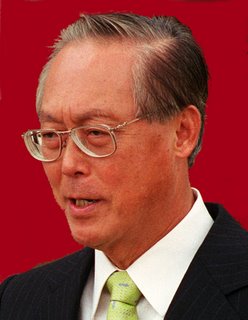 In this article, I’ll be writing on a recent and continuing history of SM Goh Chok Tong with a slight twist. There are little doubts that he was a popular PM in comparison with his predecessor and successor. His “softer” approach and style was a breath of fresh air to many. Upon his stepping down from his premiership, there have been many articles written on his policies, his leadership and his achievements. This will not be one of them. Simply, if I do write on those standard contents, you will be better off reading the Straits Times than this lengthy blasphemy (not that Straits Times always purport the unbiased truth!).
In this article, I’ll be writing on a recent and continuing history of SM Goh Chok Tong with a slight twist. There are little doubts that he was a popular PM in comparison with his predecessor and successor. His “softer” approach and style was a breath of fresh air to many. Upon his stepping down from his premiership, there have been many articles written on his policies, his leadership and his achievements. This will not be one of them. Simply, if I do write on those standard contents, you will be better off reading the Straits Times than this lengthy blasphemy (not that Straits Times always purport the unbiased truth!).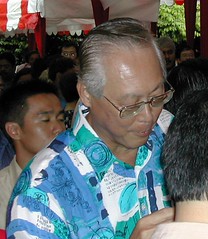 Anyway, many of policies made within the Cabinet are not unanimous. That is politics; the innate and unseen character of each participating entity. Of course, like what Lim Kim San mentioned about assessing people is that one could only briefly know the other person through observation and instinct. This is what made assessing politicians so difficult. In the public face and media spotlight, we thought we know them like friends but there are more that we don’t know than we thought we know. The resulting impact is that we place mental and perception brackets on their names, like Lee Kuan Yew (the Authoritarian), Goh Chok Tong (the Good Guy) and the Cabinet (the group of “Yes-men”) based on what the media feeds to us. This article (or blasphemy, depending on how you see it) will just add fuel for your thoughts with statements from GCT and on GCT. Ultimately, this blog can’t claim to know or speak the unspoken truth on GCT or any politicians, but just form an alternative perception track. I’ll leave you to make your own conclusions.
Anyway, many of policies made within the Cabinet are not unanimous. That is politics; the innate and unseen character of each participating entity. Of course, like what Lim Kim San mentioned about assessing people is that one could only briefly know the other person through observation and instinct. This is what made assessing politicians so difficult. In the public face and media spotlight, we thought we know them like friends but there are more that we don’t know than we thought we know. The resulting impact is that we place mental and perception brackets on their names, like Lee Kuan Yew (the Authoritarian), Goh Chok Tong (the Good Guy) and the Cabinet (the group of “Yes-men”) based on what the media feeds to us. This article (or blasphemy, depending on how you see it) will just add fuel for your thoughts with statements from GCT and on GCT. Ultimately, this blog can’t claim to know or speak the unspoken truth on GCT or any politicians, but just form an alternative perception track. I’ll leave you to make your own conclusions.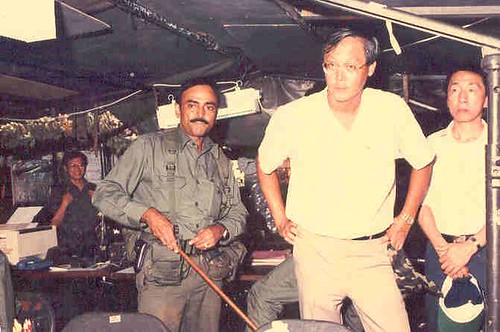 First, we must know that LKY’s book was an international bestseller across many countries, and read by most leaders around the world. Second fact is that whatever he wrote in his book about GCT or LHL would be what foreign leaders read about them. In that chapter, he described GCT as “not a natural politician…tall, gangling and awkward, and spoke English with a heavy Hokkien accent.” This is not the best description for the person who is about to succeed you. LKY also described GCT as “self-conscious and without the gift of speech-making but had ability, dedication and drive, and was interested in people”. Later LKY even mentioned that he found an English women to teach GCT to speak in a more relaxed and natural way. For a person who will be Prime Minister, he still needed someone to assist him to look for a tutor? This might have pointed out that GCT wasn’t really in the “driving seat” but had an instructor beside him, constantly.
First, we must know that LKY’s book was an international bestseller across many countries, and read by most leaders around the world. Second fact is that whatever he wrote in his book about GCT or LHL would be what foreign leaders read about them. In that chapter, he described GCT as “not a natural politician…tall, gangling and awkward, and spoke English with a heavy Hokkien accent.” This is not the best description for the person who is about to succeed you. LKY also described GCT as “self-conscious and without the gift of speech-making but had ability, dedication and drive, and was interested in people”. Later LKY even mentioned that he found an English women to teach GCT to speak in a more relaxed and natural way. For a person who will be Prime Minister, he still needed someone to assist him to look for a tutor? This might have pointed out that GCT wasn’t really in the “driving seat” but had an instructor beside him, constantly.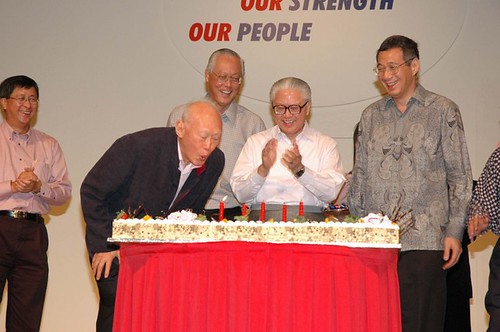 Another interesting point to the chapter was GCT not wanting move into LKY’s office. “I did not suffer any withdrawal syndrome. Chok Tong did not want to move into my old office in the Istana Annexe, which I had occupied for 20 years since I moved from City Hall, but chose to create a new office on the floor above mine.” Aside from the niceties that one might think of when he first read it, there might be more significance in that statement. Maybe LKY was literately the “power behind the throne”, or maybe it suggested how much power LKY had and wish to remind GCT about it. More importantly, what is the message that LKY wants to bring to all the leaders in the world about his deputy?
Another interesting point to the chapter was GCT not wanting move into LKY’s office. “I did not suffer any withdrawal syndrome. Chok Tong did not want to move into my old office in the Istana Annexe, which I had occupied for 20 years since I moved from City Hall, but chose to create a new office on the floor above mine.” Aside from the niceties that one might think of when he first read it, there might be more significance in that statement. Maybe LKY was literately the “power behind the throne”, or maybe it suggested how much power LKY had and wish to remind GCT about it. More importantly, what is the message that LKY wants to bring to all the leaders in the world about his deputy?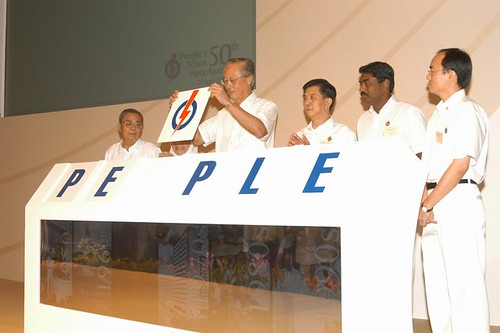 However, his first GE (1991) was setback from him and probably changed his “election personality” several degrees. In the 1991 GE, the PAP lost a record of 4 seats to the opposition, one of which was his female Senior Minister of State, Seet Ai Mee. Other wards, such as Bukit Batok, were barely won by the PAP. That election was the turning point of his “election mentality”. Since then, he has opted to be tougher during elections with his words and actions.
However, his first GE (1991) was setback from him and probably changed his “election personality” several degrees. In the 1991 GE, the PAP lost a record of 4 seats to the opposition, one of which was his female Senior Minister of State, Seet Ai Mee. Other wards, such as Bukit Batok, were barely won by the PAP. That election was the turning point of his “election mentality”. Since then, he has opted to be tougher during elections with his words and actions.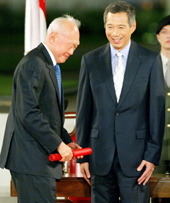 The world has seen plenty of examples of the difficult relationships between the leaders and their deputies. All these incidents led both LKY and GCT to rethink their own potentially precarious position. No matter what LKY said, deep down, he wanted LHL to be the Prime Minister someday. And he could only exert his influence if he is still in Cabinet. And for GCT, he knows what LKY wants from him and knows that LKY still has the ability and power to remove him should there be a need to. This is a tango that both are dancing in secret. Given their delicate relationship, it is not surprising to see GCT echoing most of LKY views and words. If you look through all the news reports on GCT, majority of his words are singing in the same tune as what LKY previously sung. In the opinions of many, GCT never really stepped out of LKY’s shadow.
The world has seen plenty of examples of the difficult relationships between the leaders and their deputies. All these incidents led both LKY and GCT to rethink their own potentially precarious position. No matter what LKY said, deep down, he wanted LHL to be the Prime Minister someday. And he could only exert his influence if he is still in Cabinet. And for GCT, he knows what LKY wants from him and knows that LKY still has the ability and power to remove him should there be a need to. This is a tango that both are dancing in secret. Given their delicate relationship, it is not surprising to see GCT echoing most of LKY views and words. If you look through all the news reports on GCT, majority of his words are singing in the same tune as what LKY previously sung. In the opinions of many, GCT never really stepped out of LKY’s shadow.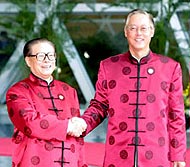 One question that no one explicitly asked was whether the system and post of Senior Minister would exist when LKY passes. The current situation, of having two former Prime Ministers in the present Cabinet (plus the present PM), is unprecedented in any part of the world. Since it currently exists, the question should really be whether it should continue to exist and will it cease to exist. There are some coffeeshop talks on this issue that before LKY passes, GCT will either step down or have his loyal men removed. (According to market talks) Given LKY sensitive nature developed during the tumultuous times (see the History of PAP) and struggle of the traumatic party split, he will leave nothing to chance. Although the possibilities of a party split or power struggle is negligible, he will not rest until that has been resolved even after his death.
One question that no one explicitly asked was whether the system and post of Senior Minister would exist when LKY passes. The current situation, of having two former Prime Ministers in the present Cabinet (plus the present PM), is unprecedented in any part of the world. Since it currently exists, the question should really be whether it should continue to exist and will it cease to exist. There are some coffeeshop talks on this issue that before LKY passes, GCT will either step down or have his loyal men removed. (According to market talks) Given LKY sensitive nature developed during the tumultuous times (see the History of PAP) and struggle of the traumatic party split, he will leave nothing to chance. Although the possibilities of a party split or power struggle is negligible, he will not rest until that has been resolved even after his death.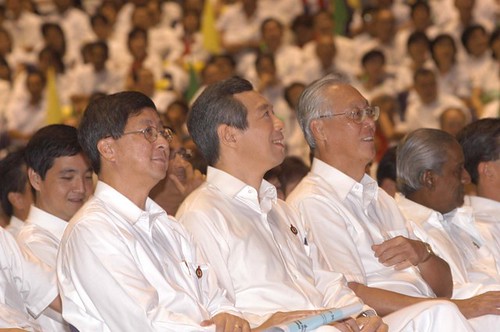 For LHL’s team to be effective, it is vital and necessary for him to place his people into the key Ministries. As predicted before the GE 2006, I expected Yeo Cheow Tong, Lee Boon Yang and Lim Boon Heng to gradually step down (within one year) and it is taking shape now. Yeo Cheow Tong has stepped down, and both Lee Boon Yang and Lim Boon Heng have indicted their stepping down within a year. MPs loyal to GCT like Dr Tan Cheng Bock (Golf partner of GCT) have also stepped down. For GCT himself, he has been assigned to foreign and finance affairs issues such as Middle East Islamic finance hub and Malaysia bilateral issues. This isolates his impact on “domestic politics”, leading him away from the public eye and leaving room for LHL in the spotlight. Again, there is nothing wrong with that, all in the name of “renewal”.
For LHL’s team to be effective, it is vital and necessary for him to place his people into the key Ministries. As predicted before the GE 2006, I expected Yeo Cheow Tong, Lee Boon Yang and Lim Boon Heng to gradually step down (within one year) and it is taking shape now. Yeo Cheow Tong has stepped down, and both Lee Boon Yang and Lim Boon Heng have indicted their stepping down within a year. MPs loyal to GCT like Dr Tan Cheng Bock (Golf partner of GCT) have also stepped down. For GCT himself, he has been assigned to foreign and finance affairs issues such as Middle East Islamic finance hub and Malaysia bilateral issues. This isolates his impact on “domestic politics”, leading him away from the public eye and leaving room for LHL in the spotlight. Again, there is nothing wrong with that, all in the name of “renewal”.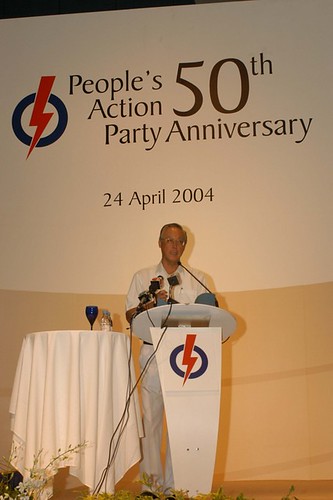 GCT openly challenged the opposition parties to test Marine Parade GRC (his ward). Yes, all MPs and Ministers also challenged or stated that they welcomed opposition contest. But for GCT, it was different. He needed the contest to demonstrate that he is still more popular than LHL, something which he is sure of but required undisputable figures. If he scored well in the contest, it might prolong his career in LHL’s administration or (very remotely and speculatively) offer him a chance of a comeback (which GCT himself wouldn’t even expect or probably want). But he didn’t receive a contest and it turned out worse.
GCT openly challenged the opposition parties to test Marine Parade GRC (his ward). Yes, all MPs and Ministers also challenged or stated that they welcomed opposition contest. But for GCT, it was different. He needed the contest to demonstrate that he is still more popular than LHL, something which he is sure of but required undisputable figures. If he scored well in the contest, it might prolong his career in LHL’s administration or (very remotely and speculatively) offer him a chance of a comeback (which GCT himself wouldn’t even expect or probably want). But he didn’t receive a contest and it turned out worse.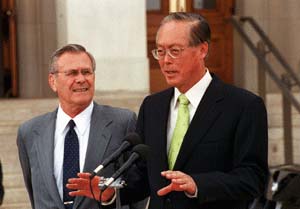 If (1) happens, LHL will be credited for winning back the PP and Hougang but not GCT, since GCT was not able to do it when he was PM. But the government will run into lots of foreign affairs (such as democracy advocators) issues of having no oppositions in parliament (inter-parliamentary visits require oppositions as well).
If (1) happens, LHL will be credited for winning back the PP and Hougang but not GCT, since GCT was not able to do it when he was PM. But the government will run into lots of foreign affairs (such as democracy advocators) issues of having no oppositions in parliament (inter-parliamentary visits require oppositions as well). 